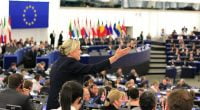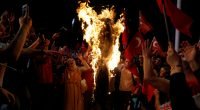Test of Turkish society

Date posted: December 25, 2013
MARKAR ESAYAN
The tension and debates that sparked following a corruption operation launched on Dec. 17 had its first political results with the resignations of three ministers. It is very likely that there will be a Cabinet reshuffle this week. This Cabinet reshuffle, which had earlier been planned due to some ministers running in the local elections, has given the government an important opportunity following the operation. In this way, the transition will be less turbulent.
Yes, corruption is a very serious problem but it is not our main problem. A very crucial test is awaiting Turkish society.
Let me try to elaborate on this.
Over the past 11 years, Turkey has been undergoing an important transformation. While it seems to defend secular and modern-looking Western lifestyles, it is trying to come out of the tangle of Kemalism, which is a regime disregarding democratic values of the West. Even if Kemalism had at first dreamed of establishing a real Western democracy, it was later defiled and turned into a hegemony of the elite. As a matter of fact, the state became like a gang and oppressed its own people. The state was involved in a massacre in Dersim in the early years of the Turkish Republic and it defended the most painful methods of violence against Kurdish citizens in the 1990s. On Feb. 28, 1997, since the legitimate government was a party of the “pious,” it was removed from power via a coup by this secular-looking elite front. Christian citizens were forced to leave the country by Kemalists a long time ago.
Yes, there are efforts to change this state structure over the past 11 years under the political leadership of the Justice and Development Party (AK Party) and thanks to a growing support from the majority of the public. As a matter of fact, the military’s tutelage in the country has been curbed and civilian politics has gained power. The power derived from the military tutelage was passed onto politics and civil society. The democratic coalition which fought against the military tutelage has become free to re-establish the country.
But for some reason, in the current more democratic atmosphere, we debate with each other in a harsher manner using the old methods of the military tutelage. It is not an armed tutelage which is calling the shots during the recent prep schools debate or the graft investigation. Rather, there are civilian groups such as the government and the Hizmet movement. But the tension is as high as it was in 2007.
Of course, this situation can be explained by referring to the lack of a democratic culture. Civilians interact with each other as if they are combating the guardianship. More precisely, they severe their relationships with each other. This destroys the possibility of dialogue and negotiations. Thus we are left with arm wrestling.
However, another major issue is that the underlying structure of the state and civil society still belongs to old Turkey. Corruption is just one of these parameters. Everyone says that the rule of law and democracy should govern us and expects these values to be upheld. This is a nice point. But what if the state apparatus and the legal framework are very problematic? Therefore, it is impossible to assume that we live in an ideal democracy where the rule of law is valued and to maintain our debate accordingly. And the rhetoric of the rule of law and democracy becomes functional only for those who benefit from them.
Everyone was confused over whether there is a united, independent team within the judiciary and police departments who do not have any political goals. But if there is such a team, no one will be surprised. Because there are established traditions in these institutions, we have not taken any steps in order to make them more transparent. Since 100-year-old institutions cannot become more democratic by themselves, the existence of such a team seems more likely to people. This is why, unlike the people living in democratic state governed by the rule of law, we cannot discuss the corruption investigation within its parameters.
In such a situation, people are inclined to support their elected government even if its members engage in corruption. This is because the government is a visible structure which can be changed, the other structure is invisible and people have traumatic memories about invisible structures.
Source: Today's Zaman , December 25, 2013
Tags: Democracy | Hizmet (Gulen) movement | Turkey |
























